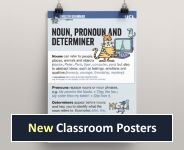Word Formation: Compound Adjectives
Lesson
Starter
Last lesson we saw how adjectives can be combined with nouns to make compound nouns, such as blackbird or red card.
Are these next two examples the same or something different?
- grass-green
- lifelong
These words are both examples of compound adjectives.
Welcome back!

Englicious is totally free for everyone to use!
But you will have to log in to see our library of teaching resources.
If you don’t have an account, that’s perfectly OK. You can register (for free).
It only takes a minute or two.
»
- Printer-friendly version
- Log in to view or leave comments

